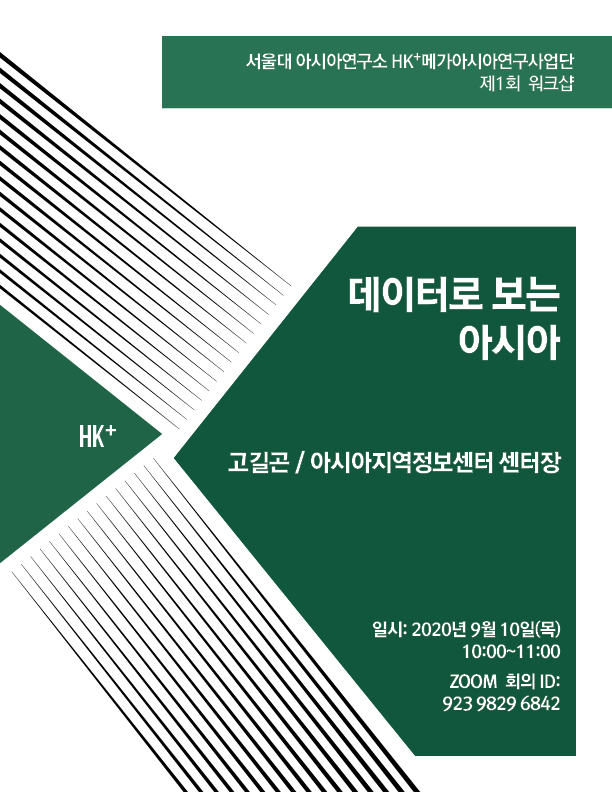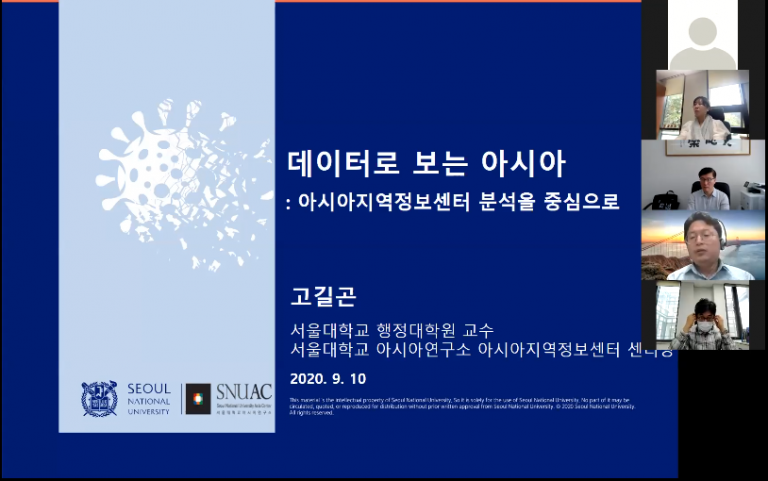
Seeing Asia Through the Lens of Data
- Date: September 10th, Thursday, 2020 10:00-11:00
- Online seminar via Zoom (ID: 923 9829 6842)
Which index can best explain the identity and dynamics of Asia? In the third year of HK+ project phase 1, the project for developing Asia Index should be started. Thus we are starting relevant discussions with the topic, “Seeing Asia Through the Lens of Data”. We will continue developing a multilayered approach to data for conceiving a “newly imagined” Mega-Asia.
This presentation seeks to show the two possibilities of ‘research based on data’. First will be through showing the vision of research that Asia Regional Information Center (ARIC) holds, and second will be the possibility of combining research between the data-cluster research within HK+ project team and that of ARIC, and how the latter can be combined with other research areas of programs and centers at SNUAC.
First of all, the presentation took one case of ‘research based on data’ as ‘Asian Politics Seen through Data: Political Systems and Democracy’, the collaborative research between ARIC and ‘Asia Regional Review Research Team’ for the September issue of the latter’s webzine DiverseAsia. The collaboration is meaningful in terms of ARIC activating research through data by being combined with various research teams at SNUAC. It explained how to measure Asian politics in terms of democracy and political systems. Though it would be important for SNUAC to produce indices with authority and suggest independent measurement methods, the current reality was occupied with how to utilize the existing indices well. Thus when explaining Asia’s political systems and democracy with existing indices, we found that there are various Asian nations existing ubiquitously and that it is possible to group them based on such ubiquitousness, which would allow us to reconstruct the categorization based on the existing indices.
Next, the presentation proceeded to discuss the vision and current status of ARIC, and its development plan. ARIC is collecting data by sorting them into macro data, microdata, internet resources, and academic resources. They are commonly classified into quantitative data and qualitative data, and ARIC plans to collect both types for even the macro data. For example, macro data consist of Country Profile, Country Report, Data analysis & Visualization, and Issue Papers. The Issue Papers that have been published until now include one that was related to COVID-19, and especially the one that dealt with COVID-19 and economic interactions received a lot of public response. Next, an explanation was given on the interaction among the SAS macro data module as the conceptual map of ARIC’s DB construction, the database for composing and collecting Country Reports, data module for general current situations, and data modules of specific issues. ARIC is organizing the conceptual map on the data being measured globally and is collecting all the data that ensue. Thus the development route is as follows: Database → Country profile → Country reports → Regional reports → Issue Papers. Lastly, ARIC’s vision is eventually firmly providing a regional perspective. The vast amount of data collected in Europe or the U.S. until now shows much reflection of the Western view based on Orientalism. Therefore it is necessary for us to build our own regional perspective as we collect and analyze data. To overcome such a problem, it is crucial for ARIC to collaborate with many related research institutes in Asia.
Based on this presentation, the following discussion proceeded. First, organizing the tree map (theme-index-sub index) between indices was a massive project. It seems very necessary that ARIC provides the metadata on indices in order to advance itself. In many cases, there is no specific explanation on how that specific index was managed, so if ARIC provides metadata information along with the data, it would secure a far superior factor of differentiation. Second, there is the problem of solving the gap between the index and its interpretation. Third, the availability of data from the Asian region substantially lacks in the current state, and how can we overcome such limitations? In this case, the problem of analyzing and interpreting still remains, and how can these limitations be overcome? Fourth, it was suggested that ARIC should think about its differentiated strategy while paying attention to Our World in Data. Fifth, does SNUAC have an index that it can develop on its own? Sixth, how can the data from the ‘Asia regional perspective’ be generated, as HK+ MegaAsia Research Project Team envisions, and how will we turn the special context and situation of the region into data? How could we theorize and measure the various forms of democracy existing in Asia? Seventh, how could be overcome data orientalism, and eight, how can scholars in humanities and social sciences be combined with ‘data’ in the center? Ninth, how could be overcome the limitations of accumulating ‘state’-oriented data, or how could we capture the HK+ research themes of Asia’s exchange and flow in terms of data?
Among these important issues, some impressive answers from the presenter are as follows. The first is that the strategic differentiation of ARIC can come from the nature of SNUAC. The institute is a meeting point of humanities and regional studies, and the data of ARIC should reveal such characteristics well. Another is that as we go beyond SNUAC and combine all SNU researchers related to Asia, ARIC can be enriched and renewed. To the question regarding what kind of index that SNUAC could develop on its own, the presenter answered that it could deal with research on “Asia’s culture and context”. Until now, there has not been any research tradition that deals with indices and measurements based on elaborate research on Asia’s culture and context. How we theorize this regional context and cultural specificity and create measurable areas would be the direction to overcome ‘data orientalism’. Moreover, in order to build a research tradition based on ‘data’ and produce exclusive data unique to ARIC, it is necessary to accumulate the collaborative experience of scholars in humanities and social sciences.


